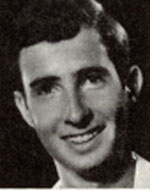Moti, son of Shifra and Leon Aryeh, was born in Ramat Gan on June 22, 1950. Moti studied at the “Hagefen” elementary school and continued his high school studies at the Ohel Shem High School in Ramat Gan “Moti was a student in the real world, and in the summer of 1968 he passed the matriculation exams, and Moti was fond of dismantling everything and assembling it again, He was fond of his teachers and was admired by his classmates, and when he was a boy he was registered as a member of the Israel Aviation Club, and he built models, got to know the gliders and participated in national competitions. Moti was a sociable youth, active in the youth movement of the Scouts, who initiated and organized various social events, participated in trips and trips throughout the country, and set out on his own journey. In special architectural structures and in various forms of construction, and visited places of artistic and engineering interest. “Friends say:” Moti was an example of exemplary order, planning and precision. On the eve of his enlistment in the IDF, Moti was a tall, sturdy, handsome young man who was recruited to the IDF in mid-August 1968 and volunteered to serve in the Armored Corps. Moti completed his tank training course and graduated as an outstanding trainee in a tank artillery course. At the recommendation of his commanders, Moti was sent to a tank commander course, where he was awarded with honors (91). His days of service in the IDF were also the days of the War of Attrition on the southern front, and Moti acted as a tank noncom, and was wounded in the leg by training. With his own hands he bandaged his wounds and did not tell his parents about his wounds. At the hospital in Be’er Sheva, he met Samlat Saad, who was his regular girlfriend. He was later sent to train at the Armored Corps School. Among his apprentices, Motti was called “the guide who knew too much.” One of them says: “Moti was an excellent instructor, everything he learned and did in a thorough and thorough way.” In the summer of 1971, when Moti was released, he turned to Ort Technicom School in Givatayim, where he studied construction engineering and architecture. During his studies, as part of a project to develop the sense of aesthetics, Moti made a monument. When the Technological College of ORT Technicom decided to commemorate the memory of its graduates who fell in Israel’s wars, they chose the model designed by Moti. When they called to inform him that his model had been chosen, it became clear that he had fallen in the Yom Kippur War. The monument is now placed in the courtyard of the school. During his studies, Moti worked on building models with a well-known architect and also helped plan a project for the restoration of the Old City of Jerusalem. A short time before his last enlistment, Moti set out on a tour of northern Israel to participate in a competition to build a monument to the soldiers of the Egoz reconnaissance unit. His dream was to build his own model for the fallen. In addition, Motti was preparing to study architecture for two years in the United States. Mutti was all the energy and momentum when he was called to the gun. At the height of the fast, Moti was called to his armored unit unit and sent to the southern front. For about two weeks he fought as a tank commander, courageously and with supreme devotion, throughout Sinai. “This time it will be our war, the armor,” he told his family as he parted from them. He was proud of his corps and when his unit was forced to expand the bridgehead that broke out with Arik Sharon’s division, he encouraged his friends and urged them to take action. On October 21, 1973, Mutti was injured when he was exposed in the turret of the tank during a brutal attack in the “Misori” area of the Suez Canal. Moti died of his wounds in the helicopter on his way to the hospital. He was laid to rest in the military cemetery in Kiryat Shaul. Survived by father, mother and sister. After they fellHe was promoted to sergeant. In a letter of condolence to the bereaved family, his commander wrote: “Your son, my dear Motti, did not return with us and was not released. In this terrible war, he gave what he loved most, his life, to the defense of us all. “In the booklet” Maabah “, the journal of Jewish Agency workers, there were written about the character and path of Moti z” l.
